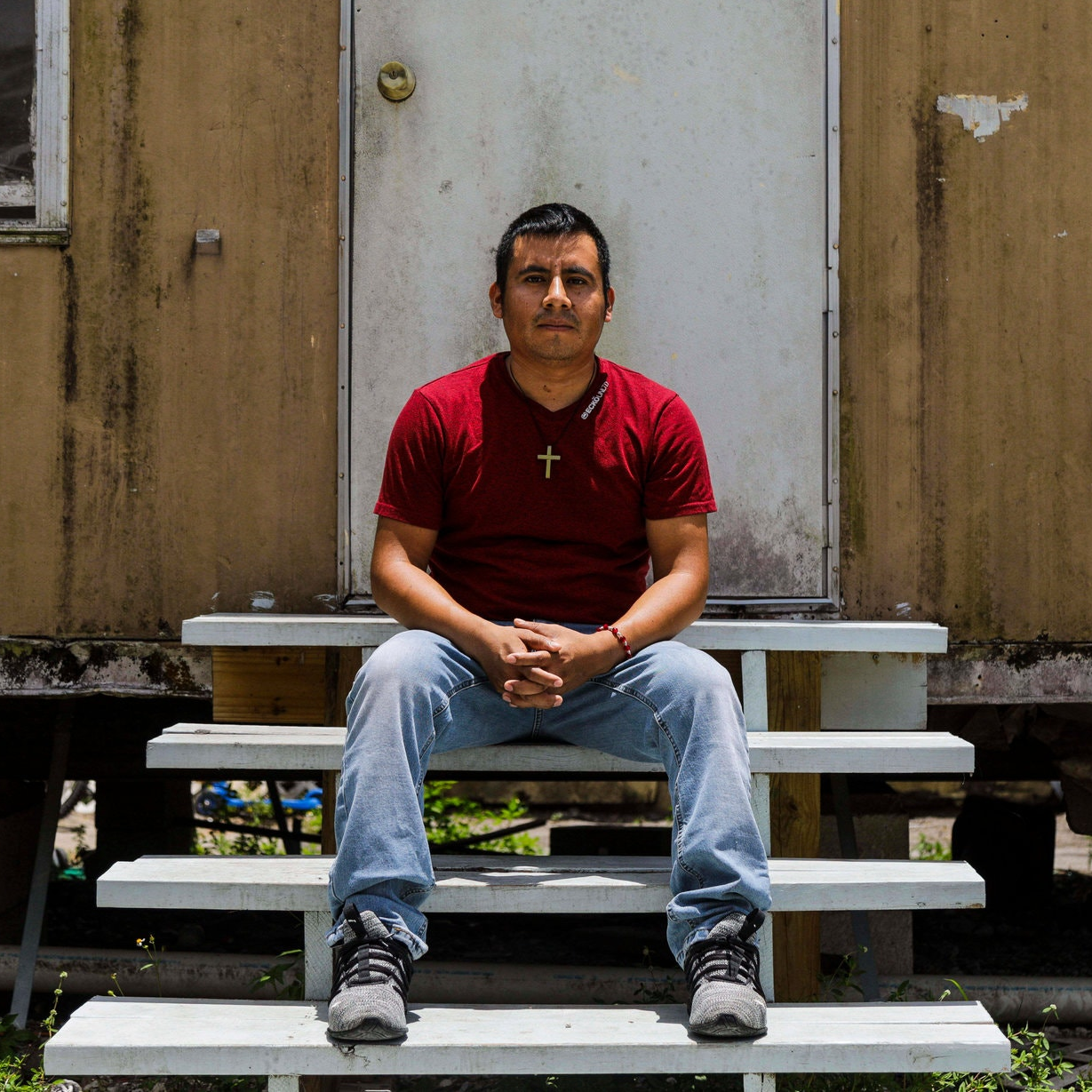
Follow Up: September Florida Food Forum
Community Organizing and the Food System
If you were unable to attend the meeting, the full presentation is available to watch online here.
To keep the conversation going, please visit our forum on Community Organizing and the Food System here to add your thoughts and comments.
On September 25th, the September Florida Food Forum on Community Organizing and the Food System featured guest speakers: Monica Petrella, Food System Program Coordinator for Hillsborough County and Wilson Perez, Farmworker Staff Member with the Coalition of Immokalee Workers (CIW), with interpreter Uriel Zelaya-Perez, National Faith Co-coordinator for the Alliance for Fair Food.
“Community organizing is vital, not just for projects related to the food system, but for any undertaking that requires community support and community. Everything from social justice work to political action to ecological restoration to caring for economically dissipated families, these and literally countless other endeavors rely on community organizing to be successful,” Dell deChant, Chair of the Policy Committee and Host of the forum, noted at the start of the program.
The first presenter was Monica Petrella, who began her presentation by defining how she sees organizing and community food systems.
“Organizing is the process of mobilizing several or many independent entities to accomplish an established unified goal, while a community food system is a conglomerate of activities, enterprises, organizations, individuals, and more that balance community well-being with agricultural production, nutrition, and food entrepreneurship.”
“If you can imagine a see-saw, on one side you have community well-being, on the other side you have these three: agricultural production, nutrition and food entrepreneurship," Monica said. "In the community system, those activities, enterprises, organizations, and individuals, are all working on different manifestations that are balancing community well-being with this production, nutrition and entrepreneurship aspect.”
Many of the ways in which the previous activities materialize within community food systems are community gardens, cooking classes, food banks, commercial kitchens, farmers markets, community supported agriculture, new and beginner farmer trainings, conservation and environmental stewardship, regenerative agriculture and permaculture, increase in small and mid-size farming, decrease in food insecurity, farm to table dinners, and agri-tourism.
Yet, as every community is its own, Monica explained that it is important for individuals to define what their community is like. To do this, they must establish what is valued as a community by identifying common denominators such as environmental justice, nutrition disparities, and economic development, and by asking questions such as “Why are we doing this hard work?” or “Why are we trying to re-establish a food system or change someone’s nutrition?”
“The faster we can find those common denominators, the faster that we can coalesce around a common unified goal,” she said.
How do we do that?
Monica described how using both theory and practice is the best to move forward in organizing.
“Theory is really important because a lot of times when you think of an idea, it has probably already been thought of. Especially when it comes to food and agriculture—one of the most ancient practices. So, oftentimes, it's probably not being done here, which is why it's a new idea to you. But, there might be another person or another place that is doing this work. So, we should go out and find what they're doing and how they're doing it.”
Monica recommended first researching best practices and models then tapping into local agencies and institutions to better understand their research and data.
“We here in Tampa have both the University of Tampa and the University of South Florida, these incredible research institutions. I’ve been to events where I’ve listened to USF researchers talk about data that they had collected locally and it was brand new to me, and I’ve been very ingrained in this work and this scene; and it’s on me to make sure that I am staying up to date on what these researchers are doing and the information they are finding.”
Putting effort into learning vocabulary and understanding what differentiates them from common or mainstream teams was another important part of theory Monica described.
“So really, just understanding what we are talking about and getting everybody on the same page when we say ‘regenerative’ or when we say ‘sustainable.’ When we say different words, what do we mean and are we all okay with the definition?”
The last important action was to continue staying up-to-date on the issues and researching through attending workshops, speaker series, and conferences.
As for practice, getting out in the dirt and collect data were the two main aspects Monica highlighted. From there, other areas include: experimenting with various models, trying new things, learning from mistakes, setting realistic boundaries, and examining strengths and weaknesses.
What are some organizing models?
“The work that motivates me and kind of guides what I do is the Collective Impact Model,” Monica said. "Within this model there are five organizational components that help to successfully create a social paradigm shift: common agenda, shared measurement, mutually reinforced activity, continuous communication, and backbone support organization."
Monica noted that the last component, backbone support organization, is what she is most closely involved with in her work. Things such as making sure that people have a place to come together, have the ability to share resources, checking to see if people are attending meetings, and making sure that the areas keep advancing. It mainly requires making sure that the other four areas in the model are being accomplished.
Social Capital is another important model which Monica describes as the “resource of relationships.” As an intangible resource, as opposed to financial, physical or environmental capital, this model is measured by the aggregate of trust, reciprocity and cohesiveness amongst community members.
By using both of these models together, communities can begin to create a strong unified coalition of people. How that is done is by individuals coming together to brainstorm and forming a collective goal and shared metrics, then designing solutions tailored to their community, but modeled after best practices.
“That process is going to take a lot of giving and trying, rough drafts, and people coming in and putting in a lot of work. Attending a meeting and then going home isn’t enough. There is a lot of work to be done, and the more people we can divide it by, the easier it will be individually. And there is so much work to be done that anything you have to contribute, that’s enough.”
The second speaker, Wilson Perez, with interpreter Uriel Zelaya-Perez, began his presentation by discussing his background and work with the Coalition of Immokalee Workers.
CIW is a farmworker human rights organization that has been focused, over the last 25 years, on how to eliminate systemic abuses in the agricultural industry in the Immokalee community. After many years of working in the fields for the agricultural industry, Wilson currently works as an organizer addressing the issues that the community in Immokalee faces.
“When we talk about the conditions that the farmworkers face, or have faced historically, we are talking about things such as sub-poverty wages for farmworkers or for farm labor, abusive conditions such as wage theft that are very rampant in the agricultural industry, things like verbal or physical abuse that is sort of a daily bread for farmworkers in the industry as well.”
Wilson also noted that although farm work does employ a diverse workforce, it is mostly done by migrants. Within that group of workers, women are the minority and are often faced with rampant abuse in the form of sexual or gender-based violence. Furthermore, one of the most extreme forms of abuse agricultural workers experience is a form of modern-day slavery. With this context, CIW began to ask farm workers what could be done to address these problems.
When the coalition first started organizing, the main target was to begin a dialogue with large-scale growers and farmer owners, advocating for the elimination of these abuses and also for a wage increase which had been stagnant for 30 years.
“What we realized in those early years of our organizing was that a lot of these farms didn’t really have significant power in order to change the industry the way we wanted to change it. That there was sort of another player in the supply chain of agriculture—big-time food corporations that exercise what we call ‘significant market power’ over the industry. When these food corporations come to our community they want to buy as cheap as possible, the best quality produce, but they don’t often take into consideration what kind of conditions the products that they were purchasing were coming from,” said Wilson.
The Coalition soon wondered why these corporations that were able to use their power to make great demands, corporations that were benefiting significantly economically from purchasing in the Immokalee community, why they didn’t demand basic human rights for the farm workers in the fields.
As a result, in the early 2000s, CIW started what is now known as the “Campaign for Fair Food,” which demanded that food corporations exercise their significant market power to change the conditions that farm workers face in their supply chain.
The first campaign was with Taco Bell. After 4 years, the campaign was able to bring about great change. Thanks to strategic organizing and consumer pressure, Taco Bell agreed to all three of CIW’s demands: 1. Taco Bell would pay one penny more per pound of tomatoes purchased which would go directly to the farm workers as an added bonus for the work that they were doing; 2. Taco Bell would subscribe to a human right conduct created by the farm workers themselves where there was a zero tolerance policy for gender-based violence and modern-day slavery in the fields; and 3. The farm workers would have a voice in the implementation of these rights in the fields.
“Since then, 13 other multi-billion-dollar food corporations have also agreed to these three demands and after capturing this significant chunk of market power, the Florida Tomato Growers Exchange (FTGE), the Florida Tomato Industry, agreed to implement these rights into what is now known as the ‘Fair Food Program.’ Which is sort of the embodiment of these demands out in the fields.”
The establishment of this program has helped to secure basic farm workers' rights—access to clean water, access to a clean bathroom and many other things beyond that.
“Over $30 million have been distributed to farm workers because of the penny more per pound bonus, over 2,200 complaints have been successfully resolved, and we have virtually eliminated forced labor and gender-based violence by way of that zero-tolerance policy in the fields,” said Wilson.
This program has also become a basis and a model that has been expanded to other industries including dairy farm workers and garment factory workers.
With the conclusion of the presentations, a fascinating question and answer session brought up many important topics that were eloquently addressed by the speakers.
Mailing List Resources:
Homegrown Hillsborough Mailing List Sign Up for News and Events
Campaign for Fair Food - Mailing List Sign Up for News and Events
Informational Resources:
Hillsborough County Website
UF/IFAS Extension Website
Coalition of Immokalee Workers Website
Fair Food Program Website
Alliance for Fair Food Website
Guest Presenter Information:
 Bio: Monica Petrella is a passionate advocate for regional food systems. She first learned about the power of regional economic systems while attending the Small Farms Conference hosted by UF IFAS in 2012. She attended the University of Florida where she graduated with her B.S. in Food and Resource Economics supplemented with a minor in Organic and Sustainable Crop Production. She then later attended the University of Vermont to earn a M.S. in Community Development and Applied Economics, specializing in Community Food Systems. She has worked on small farms, in farm-to-table restaurants, volunteered in community gardens, and met a variety of stakeholders in the Tampa Bay Food System. She has also published Teamwork Makes the Dream Work: Investigating the Impact of Social Capital in the Tampa Bay Community Food System. Previously she was involved in community organizing and political advocacy but recently started a new position at Hillsborough County as the Food System Coordinator.
Bio: Monica Petrella is a passionate advocate for regional food systems. She first learned about the power of regional economic systems while attending the Small Farms Conference hosted by UF IFAS in 2012. She attended the University of Florida where she graduated with her B.S. in Food and Resource Economics supplemented with a minor in Organic and Sustainable Crop Production. She then later attended the University of Vermont to earn a M.S. in Community Development and Applied Economics, specializing in Community Food Systems. She has worked on small farms, in farm-to-table restaurants, volunteered in community gardens, and met a variety of stakeholders in the Tampa Bay Food System. She has also published Teamwork Makes the Dream Work: Investigating the Impact of Social Capital in the Tampa Bay Community Food System. Previously she was involved in community organizing and political advocacy but recently started a new position at Hillsborough County as the Food System Coordinator.
 Bio: Wilson Perez is a farmworker staff member with the Coalition of Immokalee Workers (CIW). Wilson is originally from Guatemala and has worked in the agricultural industry across the East Coast for many years harvesting all types of produce. As part of the Fair Food Program, Wilson and his colleagues conduct workers’ rights education in the fields on all farms participating in the Fair Food Program. Wilson’s work at the CIW includes hosting daily radio shows on the CIW’s community FM radio station, leading weekly community meetings, receiving complaints of abuses in the fields, and managing wage theft claims.
Bio: Wilson Perez is a farmworker staff member with the Coalition of Immokalee Workers (CIW). Wilson is originally from Guatemala and has worked in the agricultural industry across the East Coast for many years harvesting all types of produce. As part of the Fair Food Program, Wilson and his colleagues conduct workers’ rights education in the fields on all farms participating in the Fair Food Program. Wilson’s work at the CIW includes hosting daily radio shows on the CIW’s community FM radio station, leading weekly community meetings, receiving complaints of abuses in the fields, and managing wage theft claims.
Forum Host: Dell deChant is the Associate Chair of the Religious Studies Department at the University of South Florida and a member of the Board of Directors at the Florida Food Policy Council.
The Florida Food Forum is a free event. To support our work, please consider becoming a member or making a donation. For questions or more information, contact us at: info@flfpc.org
Disclaimer: The views of the presenters do not represent the views of the Florida Food Policy Council. We are a forum for the offering and sharing of information and encourage diversity and communication within the food system.